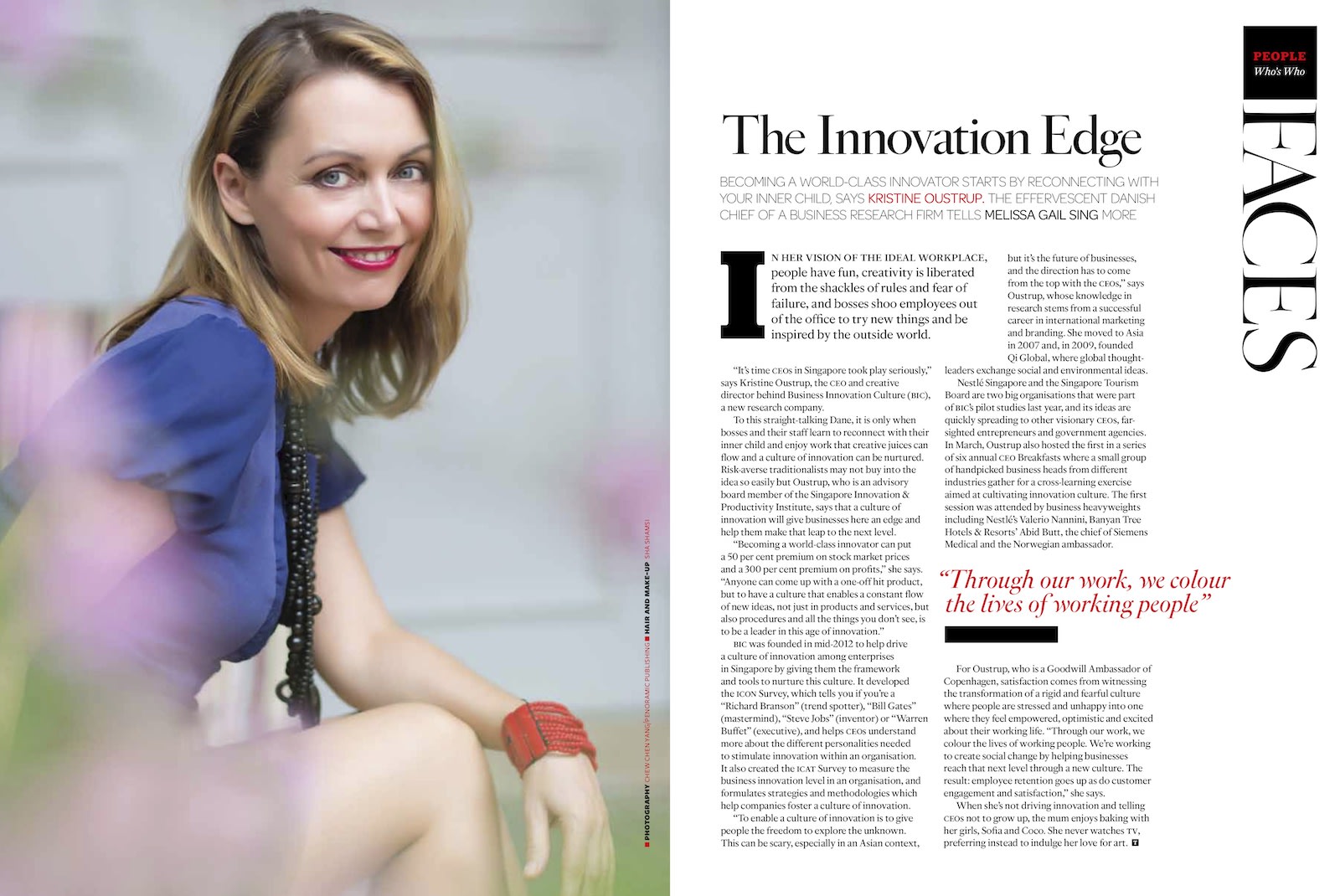Becoming a world-class innovator starts by reconnecting with your inner child, says Kristine Oustrup. The effervescent Danish chief of a business research firm tells Melissa Gail Sing more.
In her vision of the ideal workplace, people have fun, creativity is liberated from the shackles of rules and fear of failure, and bosses shoo employees out of the office to try new things and be inspired by the outside world.
“It’s time CEOs in Singapore took play seriously,” says Kristine Oustrup, the Creative Director behind Business Innovation Culture (BIC), a new research company.
To this straight-talking Dane, it is only when bosses and their staff learn to reconnect with their inner child and enjoy work that creative juices can flow and a culture of innovation can be nurtured.
Risk-averse traditionalists may not buy into the idea so easily but Oustrup, who is an advisory board member of the Singapore Innovation & Productivity Institute, says that a culture of innovation will give businesses here an edge and help them make that leap to the next level.
“Becoming a world-class innovator can put a 50 per cent premium on stock market prices
and a 300 per cent premium on profits,” she says. “Anyone can come up with a one-off hit product, but to have a culture that enables a constant flow of new ideas, not just in products and services, but also procedures and all the things you don’t see, is to be a leader in this age of innovation.”
BIC was founded in mid-2012 to help drive a culture of innovation among enterprises in Singapore by giving them the framework and tools to nurture this culture. It developed the icon Survey, which tells you if you’re a “Richard Branson” (trend spotter), “Bill Gates” (mastermind), “Steve Jobs” (inventor) or “Warren Buffet” (executive), and helps CEOs understand more about the different personalities needed to stimulate innovation within an organization.
It also created the iCAT Survey to measure the business innovation level in an organisation, and formulates strategies and methodologies which help companies foster a culture of innovation.
“To enable a culture of innovation is to give people the freedom to explore the unknown. This can be scary, especially in an Asian context, but it’s the future of businesses, and the direction has to come from the top with the CEOs”, says Oustrup, whose knowledge in research stems from a successful career in international marketing and branding. She moved to Asia in 2007 and, in 2009, founded Qi Global, where global thought-leaders exchange social and environmental ideas.
Nestlé Singapore and the Singapore Tourism Board are two big organisations that were part of BIC’s pilot studies last year, and its ideas are quickly spreading to other visionary ceo's, foreseeing entrepreneurs and government agencies.
In March, Oustrup also hosted the first in a series of six annual CEO Breakfasts where a small group of handpicked business heads from different industries gather for a cross-learning exercise aimed at cultivating innovation culture. The first session was attended by business heavyweights including Nestlé’s Valerio Nannini, Banyan Tree Hotels & Resorts’ Abid Butt, the chief of Siemens Medical and the Norwegian ambassador.
“Through our work, we colour the lives of working people”
For Oustrup, who is a Goodwill Ambassador of Copenhagen, satisfaction comes from witnessing the transformation of a rigid and fearful culture where people are stressed and unhappy into one where they feel empowered, optimistic and excited about their working life.
“Through our work, we colour the lives of working people. We’re working to create social change by helping businesses reach that next level through a new culture. The result: employee retention goes up as do customer engagement and satisfaction,” she says.
When she’s not driving innovation and telling CEO's not to grow up, the mum enjoys baking with her girls, Sofia and Coco. She never watches tv, preferring instead to indulge in her love for art.

